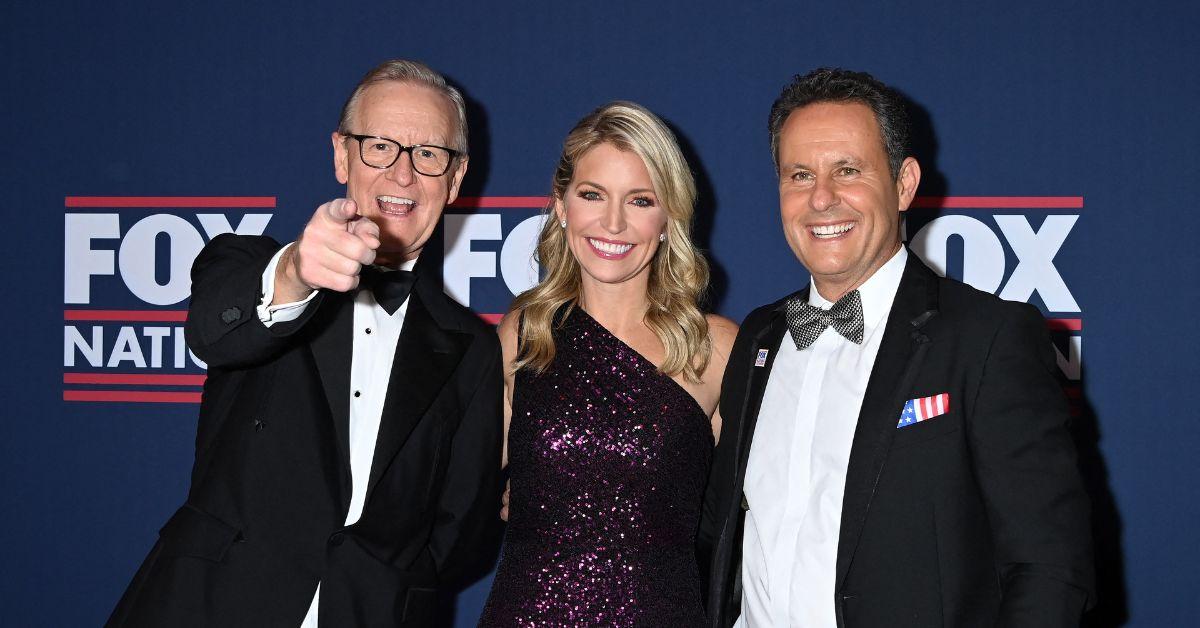Have you ever wondered about the man behind the microphone, the voice that dominates conservative talk radio and Fox News? The age of Sean Hannity has been nothing short of a media revolution. As one of the most influential figures in American politics today, Hannity's impact on public opinion, political discourse, and media culture is undeniable. This article will take you on a journey through his career, his controversies, and his lasting legacy in the world of media and politics.
Sean Hannity isn't just a name; he's a phenomenon. From his early days as a radio host to becoming a household name, Hannity has carved out a unique space in the media landscape. His ability to connect with his audience, his unapologetic stance on conservative values, and his knack for stirring up debates have made him a polarizing figure. But let's face it—whether you love him or hate him, you can't ignore the influence he wields.
So, buckle up, folks. We're diving deep into the age of Sean Hannity, exploring his rise to fame, his contributions to the conservative movement, and the controversies that have shaped his career. By the end of this article, you'll have a better understanding of why Hannity remains a dominant force in the media world, even after decades in the game.
Read also:Is Nicole Shalhoub Related To Tony Shalhoub Unveiling The Truth Behind The Family Ties
Biography of Sean Hannity
Early Life and Background
Before Hannity became the media giant we know today, he was just a kid growing up in Queens, New York. Born on November 30, 1961, Sean Patrick Hannity grew up in a working-class family. His father was a union laborer, and his mother worked as a secretary. From an early age, Hannity showed an interest in politics and public speaking. He attended Catholic schools and later enrolled at American University, where he earned a degree in Communications.
Here's a quick glance at some key details about Sean Hannity:
| Full Name | Sean Patrick Hannity |
|---|---|
| Date of Birth | November 30, 1961 |
| Place of Birth | Queens, New York |
| Education | American University (Bachelor's in Communications) |
| Profession | Radio Host, Television Host, Political Commentator |
The Rise of Hannity's Media Empire
From Radio to Television
Sean Hannity's journey to becoming a media mogul started with his radio show, "The Sean Hannity Show," which premiered in 1992. Initially, the show was syndicated locally, but it quickly gained traction due to Hannity's charismatic personality and his ability to engage with listeners. By the late '90s, the show had become one of the most popular conservative talk radio programs in the country.
In 2001, Hannity made the leap to television, co-hosting "Hannity & Colmes" on Fox News alongside liberal commentator Alan Colmes. The show was a hit, showcasing Hannity's knack for sparking heated debates and drawing in viewers from both sides of the political spectrum. Although Colmes left the show in 2008, Hannity continued to dominate the airwaves with his solo program, "The Sean Hannity Show," which remains one of Fox News' flagship shows.
Hannity's Role in Shaping Conservative Media
Conservative Messaging
Hannity has been a key player in shaping the conservative media landscape over the past few decades. His focus on issues like limited government, free markets, and individual liberty resonates with millions of Americans who share his values. Hannity's ability to simplify complex political issues and present them in a way that's easy to digest has made him a trusted voice for many conservatives.
But Hannity's influence extends beyond just his commentary. He's also been instrumental in promoting conservative candidates and causes, using his platform to amplify voices that align with his worldview. Whether it's endorsing political candidates or advocating for specific policies, Hannity has played a crucial role in shaping the direction of the Republican Party.
Read also:Jeremy Allen White Height The Real Story Behind The Stars Measurements
Key Controversies Surrounding Hannity
Media Bias and Criticism
No discussion about Sean Hannity would be complete without addressing the controversies that have dogged his career. Critics often accuse him of promoting partisan agendas, spreading misinformation, and using his platform to push personal vendettas. Hannity has faced backlash for his coverage of sensitive topics like immigration, gun control, and climate change, with some accusing him of skewing facts to fit his narrative.
Despite these criticisms, Hannity remains steadfast in his beliefs, arguing that his job is to challenge the status quo and provide an alternative perspective to mainstream media. Love him or hate him, Hannity's willingness to tackle tough topics and engage in heated debates has kept him at the forefront of political discourse.
Hannity's Impact on Politics
Political Influence
Sean Hannity's influence on American politics cannot be overstated. Over the years, he's built a loyal following of viewers and listeners who trust his analysis and opinions. This has given him significant sway over public opinion, especially among conservative voters. Hannity's endorsements have been known to make or break political careers, and his ability to mobilize his audience has proven to be a powerful asset for Republican candidates.
During the 2016 presidential election, Hannity was a vocal supporter of Donald Trump, using his platform to rally voters behind the then-candidate. His continued support for Trump throughout his presidency further cemented his role as a key figure in the conservative movement. Even after Trump left office, Hannity remains a prominent voice in shaping the political landscape.
The Hannity Effect: How He Shapes Public Opinion
Media Power and Influence
The Hannity Effect refers to the phenomenon where Hannity's commentary and coverage can significantly impact public perception and policy decisions. His ability to frame issues in a way that resonates with his audience has made him a formidable force in the media world. Whether it's highlighting a specific news story or critiquing a political figure, Hannity's influence extends far beyond his immediate audience.
For example, when Hannity focuses on a particular issue, it often gains traction in mainstream media, prompting further investigation and discussion. This amplification effect demonstrates the power of Hannity's platform and his ability to shape the national conversation. It's a testament to his skill as a communicator and his understanding of what resonates with his audience.
Challenges and Criticisms Faced by Hannity
Facing the Critics
As one of the most visible figures in conservative media, Hannity has faced his fair share of criticism. Detractors accuse him of promoting divisive rhetoric, spreading misinformation, and prioritizing ratings over journalistic integrity. Some have even gone so far as to label him a propagandist, arguing that his coverage often lacks balance and fairness.
However, Hannity has always maintained that his role as a commentator is to challenge the status quo and provide an alternative perspective. He argues that the mainstream media has its own biases, and his job is to offer a counterpoint to those narratives. While his approach may not appeal to everyone, it's clear that Hannity has carved out a niche for himself in the media world, appealing to millions of viewers and listeners who share his worldview.
Hannity's Future in Media
What Lies Ahead?
As media continues to evolve, Sean Hannity's role in the landscape is likely to change as well. With the rise of digital platforms and social media, Hannity has embraced new ways of reaching his audience, including podcasts, YouTube, and other online channels. This diversification of his media presence ensures that he remains relevant in an ever-changing media environment.
Looking ahead, Hannity's future in media seems bright. His ability to adapt to new trends and technologies, combined with his unwavering commitment to his principles, positions him well to continue influencing public opinion for years to come. Whether he'll expand into new ventures or remain focused on his current platforms remains to be seen, but one thing is certain—Hannity's voice will continue to be heard loud and clear in the world of media and politics.
Conclusion: The Enduring Legacy of Sean Hannity
As we wrap up this deep dive into the age of Sean Hannity, it's clear that his impact on media and politics is both profound and lasting. From his early days as a radio host to becoming a household name, Hannity has consistently pushed the boundaries of what it means to be a political commentator. His ability to connect with his audience, challenge the status quo, and shape public opinion has made him one of the most influential figures in modern media.
So, what can we take away from all this? First, Hannity's career serves as a reminder of the power of media to shape public discourse and influence political outcomes. Second, his unwavering commitment to his principles, even in the face of criticism, underscores the importance of staying true to one's beliefs. And finally, Hannity's success highlights the value of adapting to changing media trends while maintaining a strong connection with one's audience.
As you reflect on the age of Sean Hannity, we invite you to share your thoughts and opinions in the comments below. Whether you're a fan or a critic, your voice matters in shaping the ongoing conversation about the role of media in our society. And if you enjoyed this article, don't forget to check out some of our other pieces on the intersection of media, politics, and culture. Until next time, keep the conversation going!
Table of Contents
- Biography of Sean Hannity
- The Rise of Hannity's Media Empire
- Hannity's Role in Shaping Conservative Media
- Key Controversies Surrounding Hannity
- Hannity's Impact on Politics
- The Hannity Effect: How He Shapes Public Opinion
- Challenges and Criticisms Faced by Hannity
- Hannity's Future in Media
- Conclusion: The Enduring Legacy of Sean Hannity


